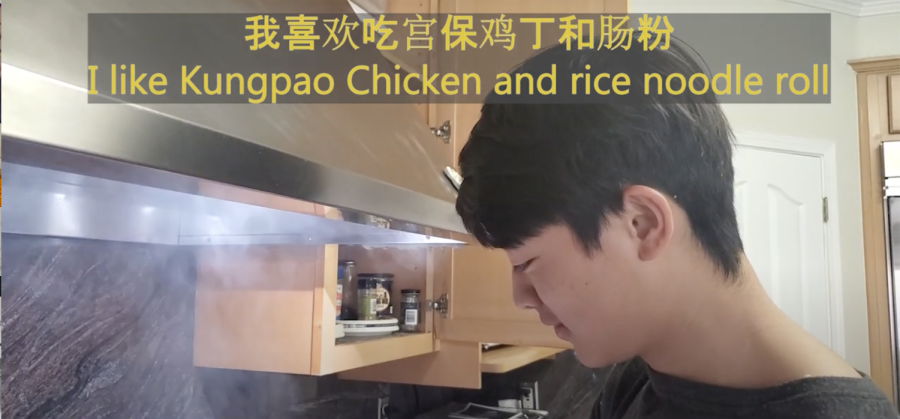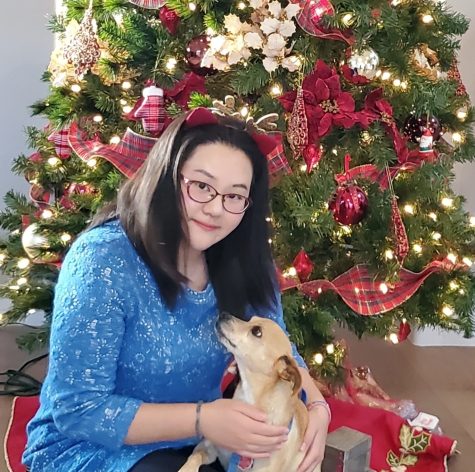Similar but so different: A Chinese student visits her American cousins
April 1, 2022
I have been in the U.S. for less than 150 days but have already been to six airports. What a journey! Chinese students cannot return home this winter vacation as before because of the COVID-19 quarantine policy — our winter break is even shorter than the quarantine period.
Unlike most Chinese or other international students who stay in Boston or travel to different places for a week, I went to San Jose, California, to visit my aunt’s family. My cousin, Brian, a freshman at the University of Southern California, is on his winter holiday. I am so lucky to observe the similarities and differences between Chinese citizens, such as myself, and Chinese Americans, such as my cousins.
Brian is a talented young man with tan skin and a contagious smile. I am eight years older, but we are still in the same generation. People in their 20s seem to do the same things, no matter where they grow up. But, I found some differences, like different motivations.
Both Brian and I played the piano. We both stopped learning it at quite a young age, but I assume I stopped earlier. He has a better foundation level than I do. Sometimes he played for a few minutes and stopped. I wanted to hear more. “I just don’t feel like playing right now,” said Brian. A funny insight is that Brian learned the piano because his parents wanted him to, but I learned because I thought it was cool seeing my teacher play.
80% of my close friends know how to play the piano or other musical instruments. Most Chinese parents force their offspring to learn. Many Chinese kids practice like crazy during summer and winter vacations to get certifications from Chinese music institutes. Many children go to Beijing or Shanghai to get certification tests. Then, after reaching levels 8, 9 or 10, they stop practicing. The piano later becomes a piece of furniture in the home to hold groceries.
The new Chopin International Piano Competition’s champion was a French-born Chinese, Bruce Xiaoyu Liu. Liu started to learn piano at the age of 7, even older than many Chinese kids, and he practiced for fun at first. Brian is like Bruce; only he is not that professional. He just practices the piano for fun or for his future girlfriend.
Brian is in good shape. I can tell he also plays sports and practices a lot. Indeed, the living room wall was full of his outstanding certifications and medals. He won many championships in tennis. Brian enjoys tennis a lot, and he is pretty good at it. He made a lot of good friends through tennis.
Chinese students likewise learn many different sports, in PE class or individually. They may continue playing sports in college. Some are so good that they are on the school team. However, they do not often participate in competitions.
Besides tennis, Brian goes to the gym almost every night with friends. He said he works out in the gym for his mental and physical health and to look good for himself and others. After coming to the U.S., I found out people like to work out in the gym. The girls can lift more than I could imagine. Brian likes to eat a juicy steak because after he works out at the gym, it can be 10 or 11 p.m. He has to make some food to replenish his energy.
The young Chinese generation often starts to work out in the gym when they begin undergrad. Before that, Chinese students worked out because of the PE tests in middle school and college entrance examinations. There is a joke in China about why it’s hard to find 11 men who play soccer well – the men took other classes instead of PE.
To prepare for the college entrance examinations, Chinese students spend nights and days studying textbooks. Seldom do they do other things or care about other issues.
Unlike Chinese kids, American kids are more independent. They have to take care of themselves, and the elder siblings take care of the younger ones. Most Chinese kids from my generation are the only child.
Most young Chinese do not cook, not to mention do other housework. I cleaned up the backyard this winter vacation and picked persimmons. In China, I lived in an apartment, not a house, and I didn’t even have a backyard because I lived in downtown Beijing.
Speaking of where I lived over the break, the area was urban. There was a walking trail near my aunt’s home. While I was walking on the path, I realized it might be one of the few chances in my life to be close to nature as I grew up and stayed in an urban area. Watching the sun go down to the mountain, seeing the morning dew, listening to the birds beeping and smelling the fresh grass… These actions are seldom witnessed back home, maybe except for the last one.
The official age to drink in the U.S. is 21, but 16 for driving. In China, both ages are 18. Fun fact: I already have two driver’s licenses, but I never drive. Brian is a great driver. Perhaps, he has more experience than a Chinese peer of his age.
People around the world have a lot in common, too. My Chinese peers enjoy playing computer games and watching TV series and movies. For instance, when “Spiderman: No Way Home” was in theaters, I watched it earlier than Brian. I tried my best not to spoil anything. We also miss our friends when separated from them, and we miss our mum’s dishes.
I will never forget a single moment of this winter. I experienced a different lifestyle. It was probably the last winter vacation of my life, watching the sunrise over the sea in Hawaii and the sunset in the mountains in California. There were a lot of first-time experiences for me, climbing Diamond Head by myself, walking Coco, the dog, paddling a surfboard, beach volleyball and picking persimmons…
Not so many international students get to experience a local lifestyle. Chinese students are mainly grouped up with other Chinese students. I am writing this not blaming us, not to dig deep, just to share.
If you do not have relatives, you can also experience local American life by hanging out with American students. You can join some clubs that you are interested in. Just do not lock yourself in your room and only communicate with people of the same culture.


